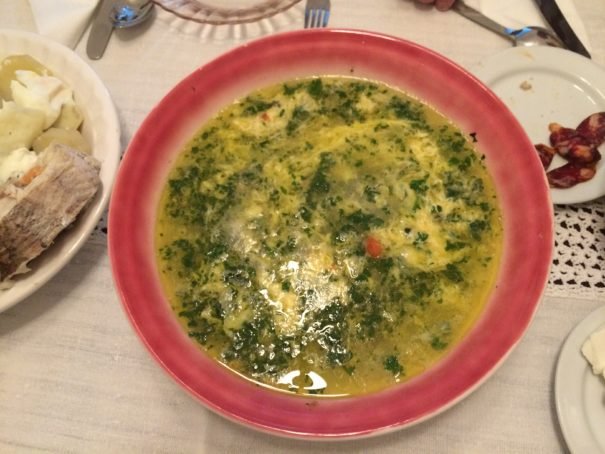
A Comfort Food From a Time of Hunger

ALENTEJO, Portugal—
Back in the 1940s, when Arnaldo Gouveia was in his 20s, he would leave his home in the village of Motrinos every night at 9 p.m. and walk five miles to Mourão, where his eight-hour shift at the paper mill began at midnight. Some nights he would arrive at work soaked by rain. Arnaldo, now 90, does not recall those days with nostalgia. “We went through so much pain,” he says. His only consolation in those days was the warm, comforting açorda he would eat most evenings before leaving home.
The basic version of açorda (pronounced “uh-soar-duh”), the kind Arnaldo ate as a young man, consists of a coriander and garlic broth fortified with stale bread. The dish has its origins in Portugal’s Arab occupation, which lasted from the 8th century to the 13th century. (The name açorda comes from the Arab “ath-thurda,” which means “bread soup.”) That dish was far simpler than the one I tasted with Arnaldo recently while visiting his son Óscar’s home in the village of Reguengos de Monsaraz, seven miles west of Motrinos where Arnaldo grew up. Óscar and his wife, Belmira, a cook in a local hotel, spent a warm summer afternoon preparing an açorda enriched with fish, eggs, potatoes, and bell peppers, served with a side of sliced figs. When Arnaldo was a child, he and his siblings would be lucky to get half a fried sardine each, a luxury forgone by his parents.
“Back in those days, there were no potatoes, nor bell peppers. Sometimes people would even make so-called blind açorda made up only with bread and garlic,” explains Belmira. According to local historian Alfredo Saramago, blind açorda referred to a soup in which the olive oil—a readily available ingredient that, for most of the population of Alentejo, was still too expensive to use on a regular basis—wasn’t visible.
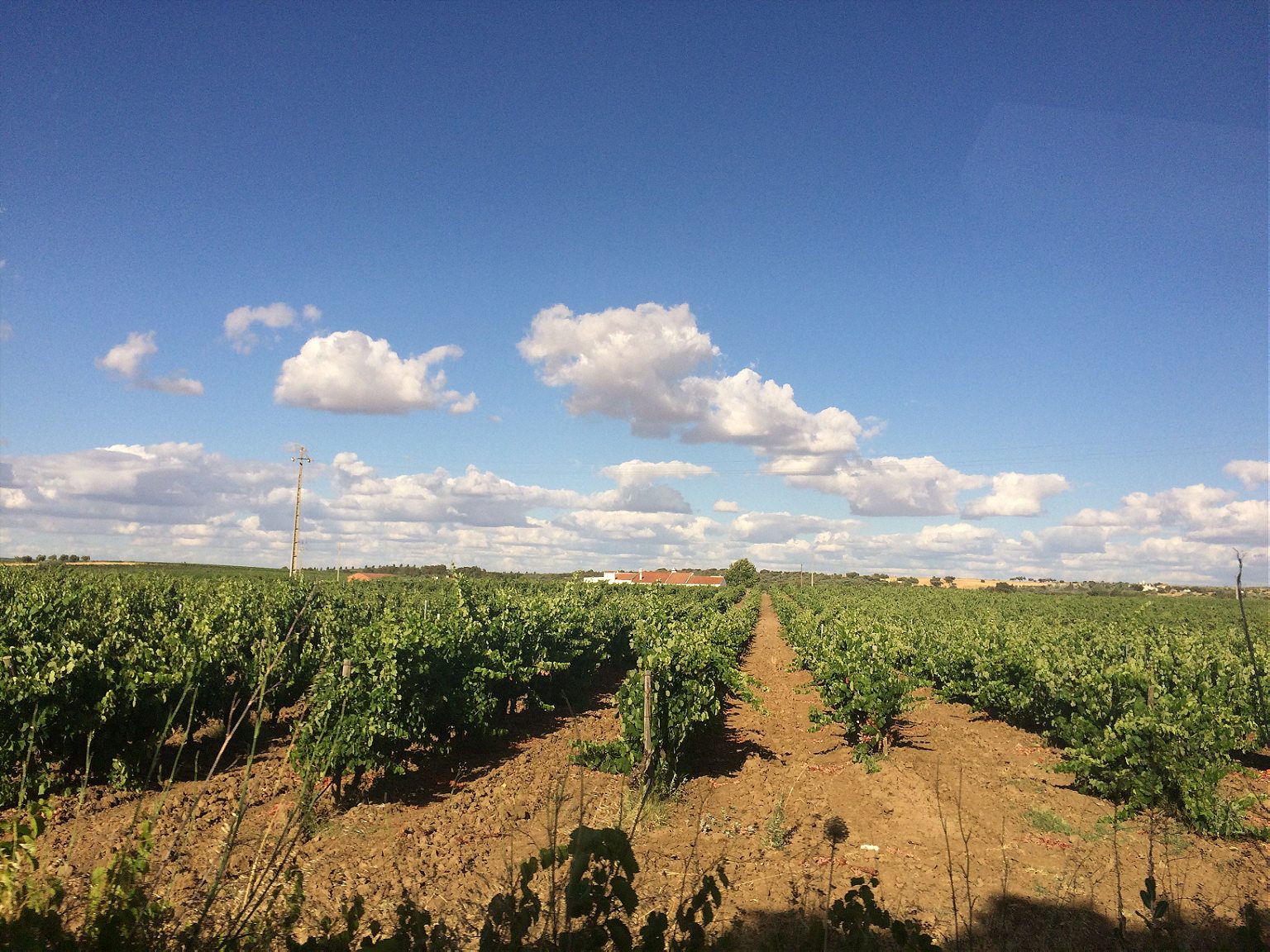
Both Reguengos and Motrinos are in Alentejo, a sparsely populated region in southeastern Portugal. Known for growing grain and cork, as well as for its practically deserted flatlands, the region maintains a cohesive communal identity even today. Made up of three provinces, Alentejo is Portugal’s largest region, similar in size to Belgium, but with just 760,000 inhabitants, 15 times less populous. Home to fewer young people than anywhere in the country, it is a place scarred by isolation, its recent history one long tale of poverty and hardship.
During the years of Portugal’s autocratic right-wing dictatorship, which lasted from 1926–1974 and was led from 1932 to 1968 by António de Oliveira Salazar, the Alentejo was the country’s agricultural engine, its largest properties owned by a handful of men, most of them friendly to the regime. Following the turbulent years of the First Portuguese Republic (1910–1926), the dictatorship imprisoned political dissidents, censored the media, and started a colonial war in Africa, all while maintaining a “mild style” back home, focusing its propaganda machine on family values, loyalty to the church, and the value of work.
Throughout this period, laborers in the Alentejo lived in misery, working from dusk to dawn, sometimes sleeping fewer than four hours per night. “It was an extremely hard life,” writes anthropologist José Cutileiro in his book A Portuguese Rural Society. “Salaries were very low, social benefits didn’t exist, and education was an unattainable goal for a rural worker’s child. Still, there was no alternative.”
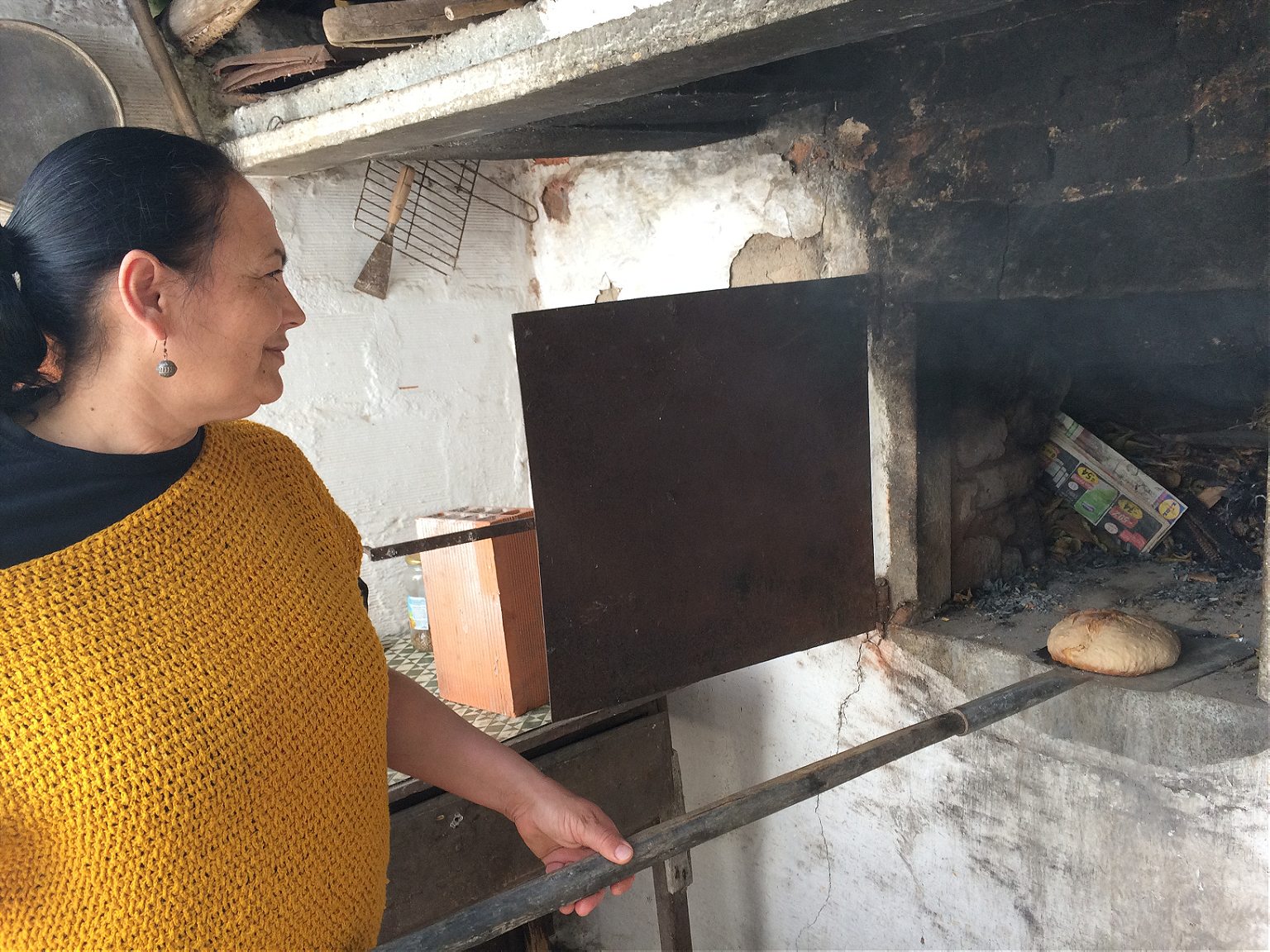
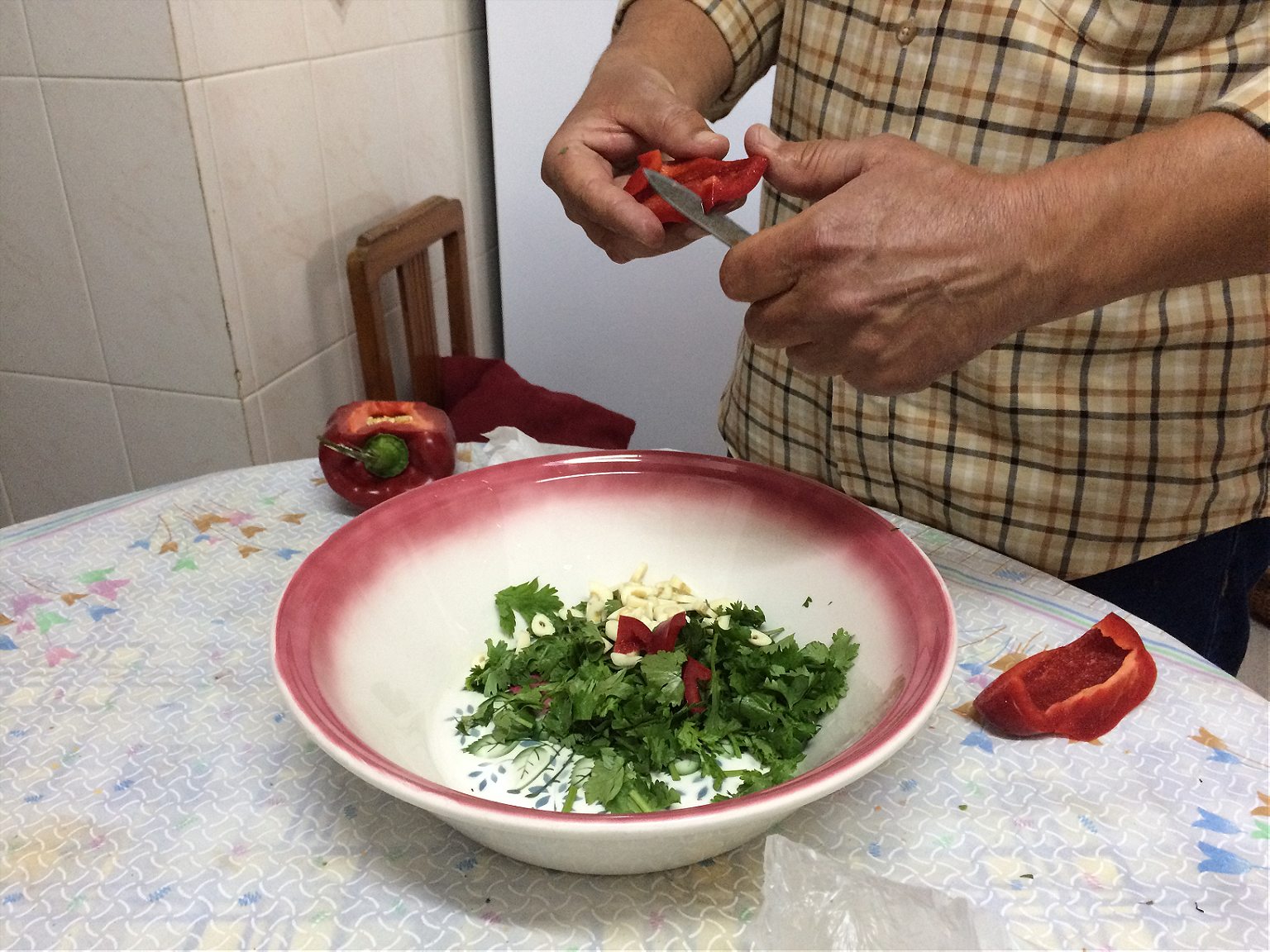
“We would end up eating two açordas per day, one during the day and one in the evening,” Arnaldo recalls, watching his family from behind thick glasses. Óscar grinds cilantro, pennyroyal (a local herb from the mint family), garlic, and red bell pepper with olive and salt into a thick paste known as the piso (literally, “floor” or “base”). Belmira manages the rest of the dish; after 27 years of marriage, they work in effortless tandem. She starts by poaching one egg per person, making sure to keep the whites intact. In a separate pot, she boils hake, cod, and potato to make a simple broth. When the fish and potatoes are cooked, Belmira sets them aside and pours the broth over Óscar’s piso. Óscar whisks raw egg yolk and adds it slowly to the broth to form threads as it cooks, a technique known in Portuguese as fios de ovos, or egg strings. Before, Óscar tells me, families would add fios de ovos when eggs were in short supply so that everyone at the table could get a bit of nourishing yolk. The fish, potatoes, and slices of hard bread are served on the side so each person at the table can assemble her own plate.
“This is a rich man’s version,” Belmira says, as she peels fresh figs, noting the array of ingredients that nearly cover the kitchen table, a side table, and most of the stovetop. “This has nothing to do with the old days.”
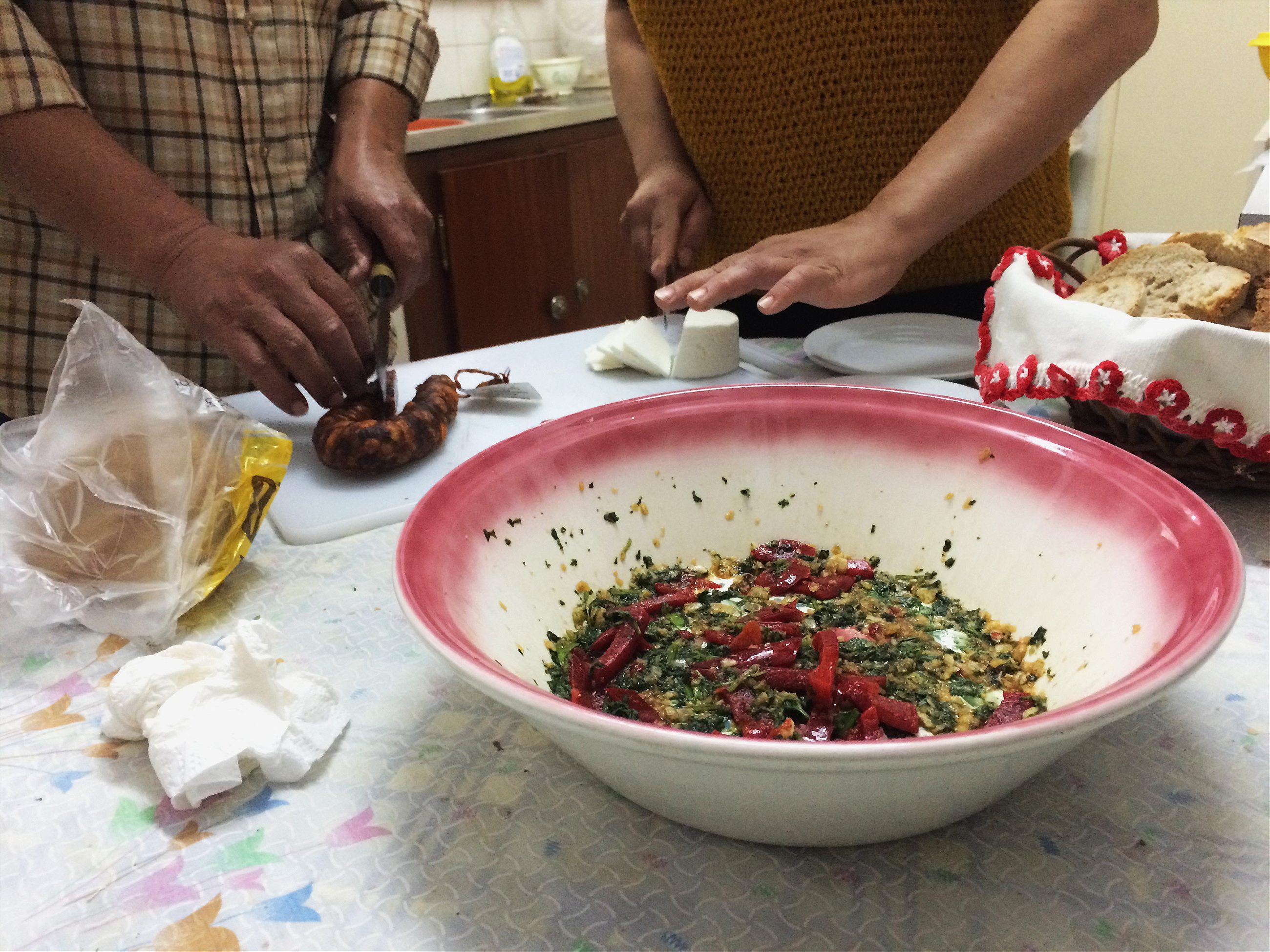
Belmira grew up the daughter of an illiterate fishmonger in the nearby village of São Pedro do Corval, moving with Óscar, her high school sweetheart, to Reguengos after their marriage. She has lived here ever since. Though they come from modest backgrounds, Belmira and Óscar, both in their 50s, stress that they themselves aren’t old enough to “remember the misery.” They came of age after the Carnation Revolution of April 1974, which put an end to the 48-year dictatorship and ushered in a period of democracy and economic growth.
The post-revolution period was also the tensest in Portugal’s recent history. The Communist Party had long been the most active opponent of Portugal’s dictatorship, which drew the attention of the Soviet Union when the regime fell. Tensions between supporters of the Socialist Party (center-left) and the Communist Party’s followers simmered throughout the summer of 1975, what became known as “the Hot Summer.” The Communist Party was particularly successful in gathering support among the rural population of the Alentejo. Rallying under the party’s slogan “The Land to Those Who Work It,” many peasants occupied the farms where they had once been laborers, often using violent force.
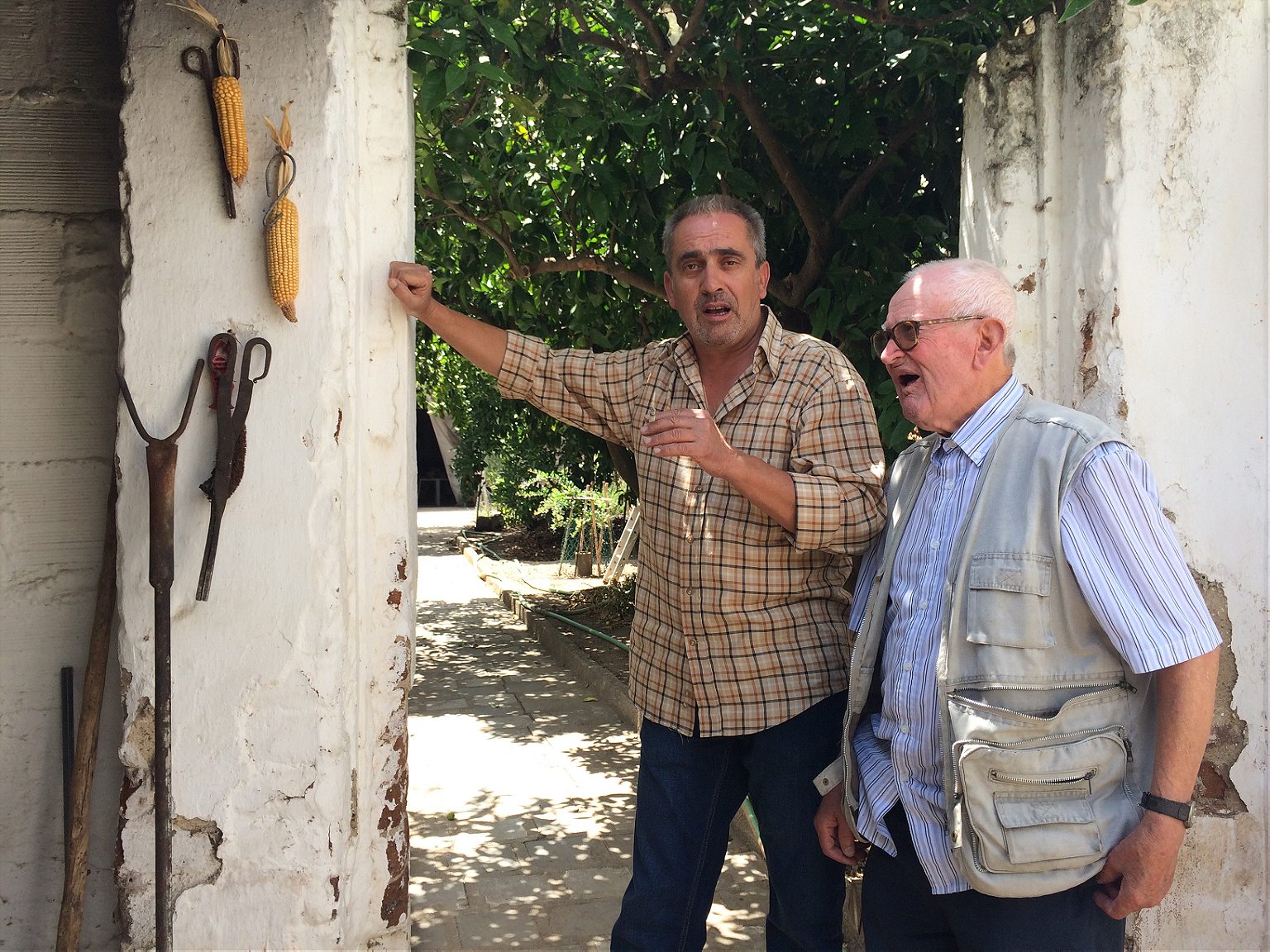
“I was a political guy through all my life, but I never really liked communism,” Arnaldo tells me as we sit down to eat. “The regime we had… I was always against it. We didn’t have freedom. We couldn’t talk about anything,” he says, looking down into his dish, where a hard slice of bread slowly soaks up the warm, fragrant broth alongside chunks of fish, sliced potatoes, and a perfectly poached egg. “But if there is one thing that pains me,” he adds bitterly, “It is to hear people who were born into poverty saying, ‘We need a new Salazar,’ ” referring to the former Portuguese strongman. Óscar, who nods along patiently as his father speaks, refills our glasses with a locally produced red wine.
Óscar and Belmira’s 24-year-old daughter, Leonor, arrives just in time for lunch. Óscar complains that young people always have their eyes glued to their smartphones. “The internet brings both good and evil things,” Arnaldo adds ambivalently. Leonor cleverly directs her defense to me, smiling widely as she explains how her parents learned to Skype a year ago when she moved to Scotland for temporary work. However, she takes her grandfather’s point. “The world moves forward, but we can’t forget our roots,” she says.
As we chat about the future, we bite into delicate morsels of mild white fish and sip warm broth, tangy with garlic and bright with coriander. The sweet, mild figs cut the richness of egg yolk and sting of garlic, a perfect accompaniment to the Gouveias’ açorda, but far from a universal one. Some families eat their açorda with white grapes, others don’t like fruit at all. Some like fried mackerel in the warm summer months, others prefer sardines throughout the year, while still others would rather not distract from the cod. Even potatoes and red bell peppers turn up only in some versions of the dish, which is as varied here in the Alentejo as it is essential.
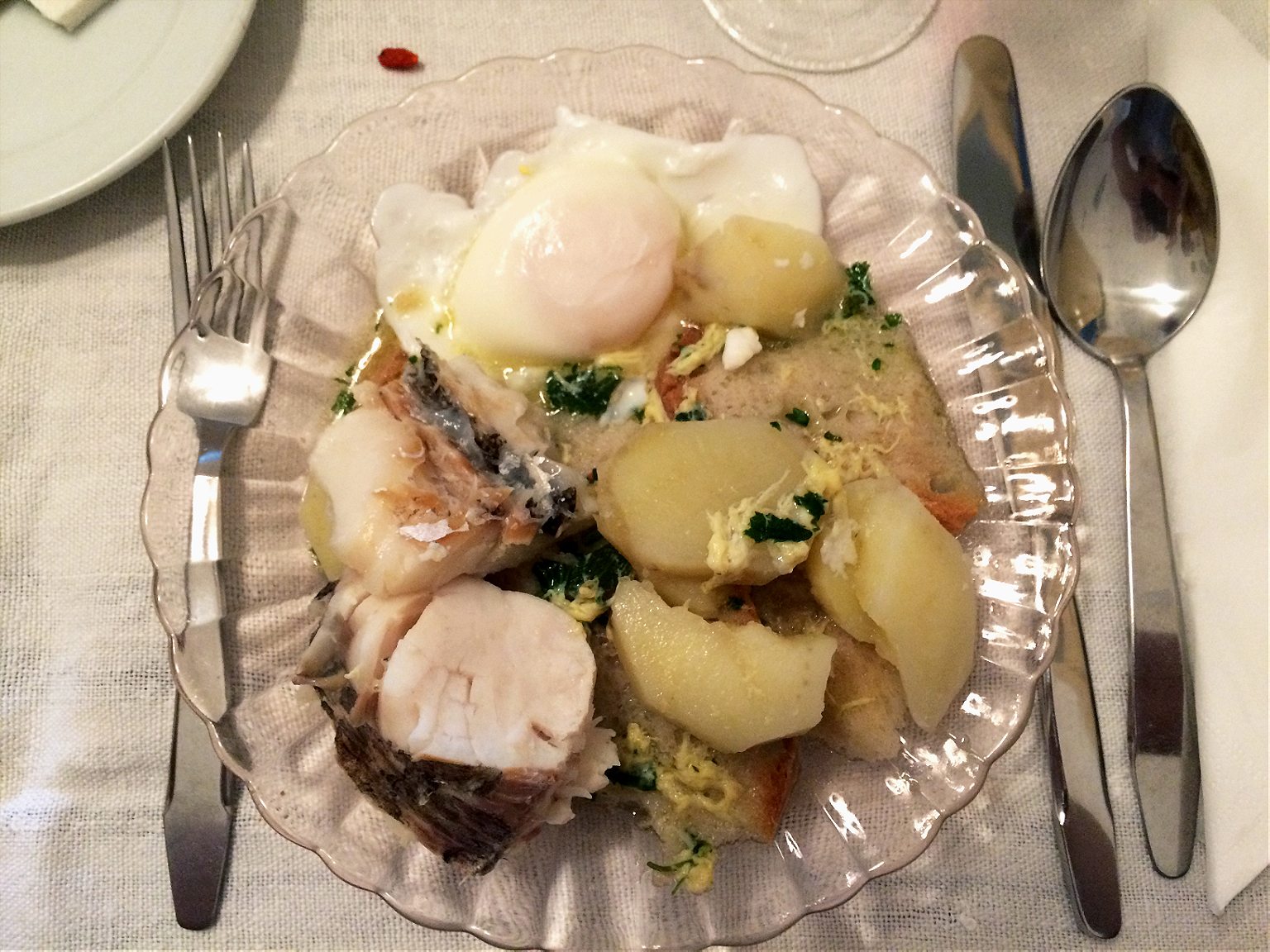
Alentejanos, Leonor says as we eat, “keep our traditions—both the good and the bad ones.” An aspiring vegetarian, Leonor continues to eat the typical dishes that define her region’s and her family’s cuisine. “I don’t like eating meat everywhere, but if everyone does as my parents do, it is totally different. I have always been interested in sustainability, and I think the Alentejo understands that notion and fosters it,” she says.
Belmira no longer keeps a goat to provide meat, as her parents did, but she still raises her own chickens for eggs and meat. The Gouveias’ backyard is shaded by apple, pear, and loquat trees planted decades ago by Arnaldo himself. They have an old wood-fired oven, where Arnaldo’s late wife used to bake her own bread. Óscar and Belmira struggle to keep the old traditions alive—these days, they use the oven just once a year, on Christmas, to roast meat—but some, particularly açorda, they’ve managed to maintain even when far from home.
Óscar tells me that when he moved to Switzerland a couple of years ago to work as a hotel clerk, “I found some baguettes that were good enough. The coriander was the hardest to find … And their olive oil sucked! But I managed.” Leonor says that, in Scotland, finding good bread is impossible, and she never stops missing the scent of coriander and garlic.
That sense of nostalgia is found in one of the Alentejo’s other important cultural traditions, a type of two-part, a cappella music known as cante, inscribed on the UNESCO World Heritage List in 2014. The songs are typically pastoral, revolving around subjects like work in the fields, courtship, and pangs for lost village life. “Cante is a link, it connects all the Alentejo,” Óscar says, just like açorda. In fact, açorda is itself the subject of one popular cante, “Açorda de Coentros e Alho”—“Garlic and Coriander Açorda”:
It is easy to do
There’s not much work to it
It’s just boiling water, coriander and garlic
“Cante arises from the fields, from the hardship of work,” Óscar says as our meal draws to a close.
“Singing and working,” Arnaldo adds cheerfully, mopping up the last drops of his soup. “Singing and working.”
